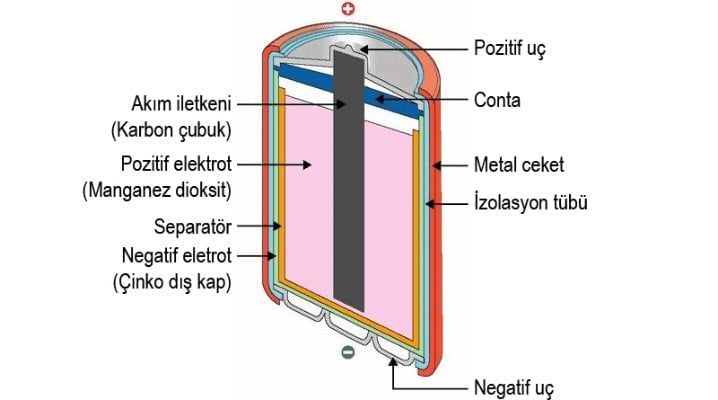What is a Battery? What are its features?

Batteries are devices that store electrical energy as chemical energy and then make this energy electrically usable. Many devices we use in our daily lives require batteries to operate. It is widely used in batteries, portable electronic devices, vehicles, watches and many other applications.
The main feature of a battery is that it can produce electricity through electrochemical reactions. The chemical reaction between the two electrodes ensures the flow of electrons through the electrolyte inside. Batteries generally consist of three main components: anode, cathode and electrolyte.
Alkaline batteries produce energy based on the chemical reaction between zinc and manganese dioxide and are often used in home electronic devices. Lithium-ion batteries rely on the movement of lithium ions and are preferred in many applications such as mobile phones, laptops and electric vehicles due to their light weight and high energy density.
Capacity refers to the maximum amount of energy a battery can store and is usually measured in ampere-hours (Ah). Voltage indicates the electrical potential difference of a battery and is expressed in volts (V).
Their lifespan may be affected by duration of use and environmental factors. Proper use of the battery, regular maintenance and storage in appropriate conditions can extend its life. Some batteries can be recharged and reused, while others are designed for single use.
Battery Life and Durability
Nowadays, technology is developing rapidly and smart devices are becoming an integral part of our lives. However, important factors such as battery life and durability of these devices still pose a big problem. Many of us struggle with batteries that drain surprisingly quickly, or are at risk of breaking our device at any moment because it's not drop-proof.
Battery life is one of the biggest concerns for smart device users. Even when we charge our battery, it can be frustrating to see it drain after a few hours. This is because battery technology is still open to improvement. However, we can extend battery life by taking some precautions. Simple steps like lowering the brightness level, closing apps running in the background, and reducing unnecessary notifications can help your battery last longer.
In addition, the durability of the devices is also of great importance. Some of us may accidentally drop our phones or spill them into water. In such cases, we can say that a durable device is a life saver. Many manufacturers try to minimize users' exposure to such risks by offering devices with shock-absorbing features.
Battery Capacity and Voltage
Battery capacity is a measure that determines how much energy we can get from a battery. Battery capacity, usually expressed in milliampere-hours (mAh), indicates how long our device can operate. Higher capacity batteries offer a longer usage time, while lower capacity batteries may have a shorter usage time.
Voltage represents the electrical potential at the output of the battery. The voltage of a battery determines the energy level required for our electronic device to function properly. Different devices can operate at different voltages, so choosing a battery of the correct voltage is important. Incorrect voltage may affect the performance of the device or even cause damage to the device.
Battery capacity and voltage are important factors that affect the performance of our electronic devices. A high-capacity battery ensures long-term use, while a battery with the correct voltage ensures efficient operation of the device. Therefore, it is important to consider these two features when choosing a battery.
Rechargeable Batteries
Today, the limitation of energy resources and their environmental impacts have led people to look for alternative energy storage methods. Rechargeable batteries are one of the solutions that are rapidly gaining popularity in this regard. They offer a huge advantage over traditional disposable batteries, as they are both environmentally friendly and economical.
Rechargeable batteries are power storage devices that can be charged and used multiple times. The most important feature that distinguishes this battery from others is that it can be used over and over again, thus contributing to the preservation of natural resources and reducing costs in the long term. At the same time, these batteries fit perfectly into the mobility of modern life, offering a wide range of applications from mobile devices to electric vehicles.
The chemical components inside the battery allow electrochemical reactions that store and release energy. When a battery is charged, energy is transferred from a source into the battery and stored as a result of chemical reactions. Then, when needed, the energy in the battery becomes available in the form of electric current.
In addition to the advantages of these batteries, they also stand out in terms of safety. Thanks to advanced technologies, it is possible to minimize risks such as overheating, explosion or leakage. Thus, users can safely use rechargeable batteries in daily life.
